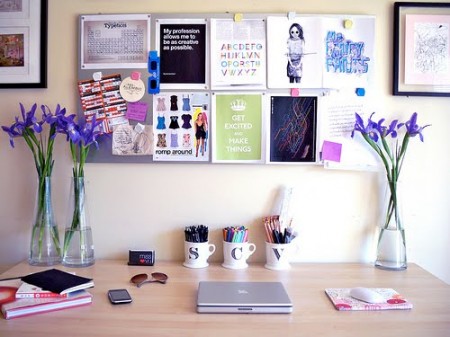Home Office & Small Office Organization
Small office organization is something we don't think much about until it's too late. You need an office, so you create one. Over time, as you work in your office, things stack and layer around you - - piles of files you keep meaning to put somewhere, software boxes, bills, receipts, magazines, newspapers, pens -- until one day, you can't find something important and you suddenly realize some office organization is long overdue.
If you answer 'yes' to any of these questions, you probably need some help getting your office organized:
- Do you spend your workday putting out fires?
- Is your desk cluttered with papers and files and you don’t know where to put new, urgent information?
- Do you procrastinate? It’s usually a sign that something is keeping you from getting to the important work.
- Do you spend part (or all) of your day being reactive instead of proactive?
Trying to re-gain control can feel overwhelming at first. I can help you completely overhaul your office to make it both functional and attractive. Even if you are not quite ready for a full office makeover there are small, manageable things we can do to organize your office right now. I can help you take charge of your work life.
If you think disorganization doesn't cost anything, think again:
** According Corp Magazine (“Business Leaders Lose Hours to Disorganization,” July, 2011), their research revealed that of the 18,000 business leaders polled, more than half said they lose nine work hours a week due to a lack of organization; and 57 percent said they lose six work hours a week becauseof disorganization.
** According to the Orange County Register (“Lost Items Cost Businesses $177 Billion,” February 5, 2011), the average U.S. employees spends 76 hours a year looking for items, files or information lost at work because of disorganization [per a survey by Brother International Corp.]
This disorganization costs U.S. businesses more than $177.8 billion a year, according to this data. The amount is based on average wage of full- and part-time office workers multiplied by the number of people in such jobs, according to the U.S. Census.
** StartUpNation.com found that same figure -- 76 hours lost per year (“Lost Time Equals Wasted Dollars”) as a result of disorganization in the workplace. For example, employees lose time searching for items around their desks and offices or have misplaced files and documents on their computers.
** The average employee spends over an hour a day just looking for things -- a file (paper or saved on their computer), business cards, notes, an email, etc.
** A recent Microsoft study indicated that the average office-based worker spends 2.1 hours a day on unnecessary interruptions and distractions.
** Per a Boston Globe report, forty-three percent of Americans surveyed described themselves as disorganized; and twenty-one percent have missed crucial work deadlines because of disorganization.
** Per several Fast Company Magazine reports (2004):
-- business executives waste six weeks per year searching for lost documents;
-- 48% of American executives admit to having a messy desk but claim to know where everything is. In contrast, 12% say that although their desk appears organized, they have no idea where to find anything.
-- People who multitask are less efficient than those who focus on one project at a time.
-- Time lost switching among tasks increases with the complexity of the tasks.
I will help you to:
* Maximize the use of your space. Our surroundings either support us or work against us. In the office environment, think of every surface, filing and storage space as valuable real estate. Make sure you are maximizing the use of yours.
* Put your time to the best use. Once we are up and running, I will give you scheduling tools which will maximize the use of your time and free up large chunks of time for you to work on important tasks without distraction.
* Prioritize. I can teach you tricks to help you remain focused. We often get caught up in the quick and easy tasks, rather than tackling the big project that could impact the bottom line. Make time for high impact activities by setting aside or delegating lower value tasks.
That's just the start to a new, efficient work space. It is more than just cleaning up mess. It's about organizing solutions -- solutions which will make you more focused and more productive. A coordinated, harmonious office will save you several hours every week.
I'll help you make new time. What you do with it is up to you.

